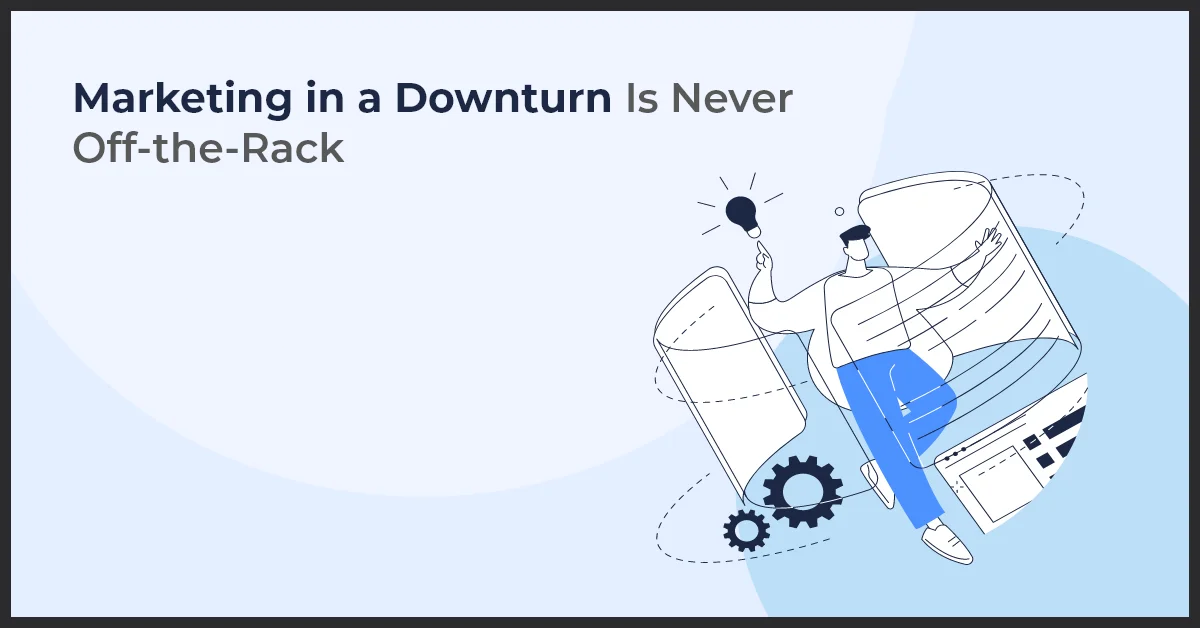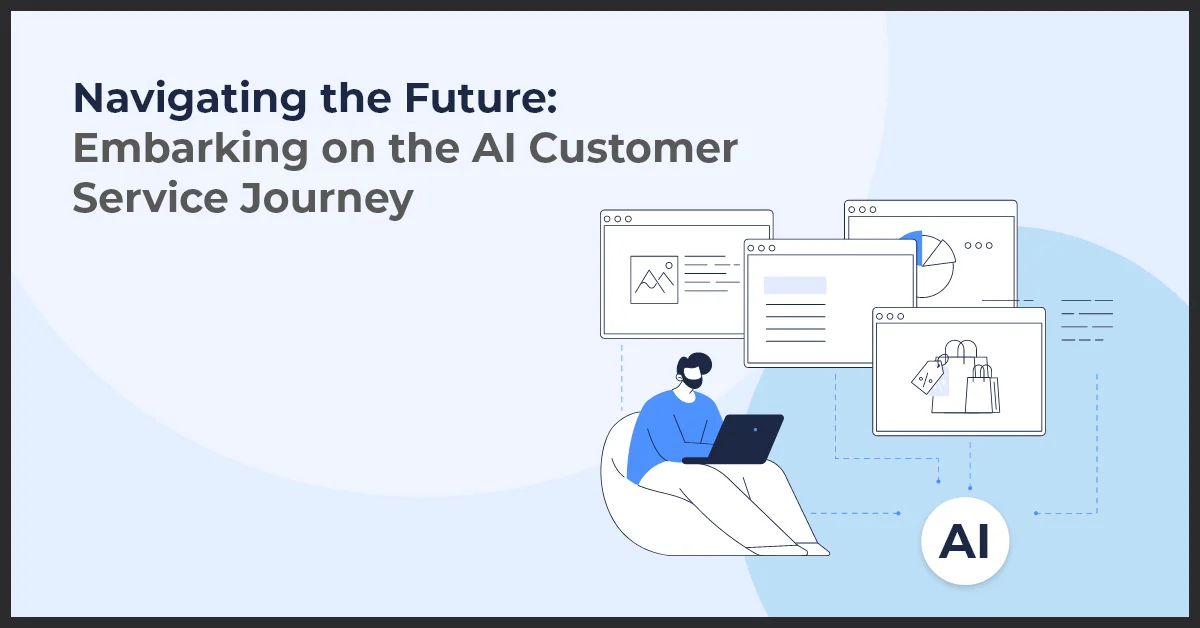Marketing in a Downturn Is Never Off-the-Rack

Published on: August 9, 2022
Updated on: June 26, 2024
505 Views
- Digital Marketing
9 min read
Scary times are coming; if you think we’re referring to Halloween, let’s pretend you're right! You must have sniffed it out by now, like fall; a recession may be around the corner.
And just like you want to prepare for the spooky days of fall with a foolproof Halloween costume - nothing too obscure nor too cliched - you want to prepare for the horrors of recession with a great marketing plan.
Here’s the issue, like a good Halloween costume, a great marketing campaign can’t be picked off the rack and must always be customized and tailored to your needs. Here’s why:
1. Everybody wants attention so the competition is at an all-time high. Unlike other parties, Halloween looks only at your outfit, and unlike other times, in a recession, only your marketing can bring in sales because you need to be that much more convincing to sell to people who aren’t really looking to buy anything.
2. Like bodies, no two brands are the same, so off-the-rack sizing just doesn’t work. Today, several brands sit at the intersection of multiple industries rather than neatly fitting into buckets like they used to. Even within buckets, brands cater to different demographics and since their question papers are all different, they can't peek into their neighbor’s test or they'll fail.
3. No two recessions are the same. You can’t just wear your outfit from 2008 this year because it was a different time with different references, memes, and icons. Your strategy from the last recession won’t keep up with the changed parameters and advanced technology of today.
Your consumers have changed and so have their needs. It is pointless to try to charge today’s dying iPad with a cable from 2008 because it won’t even fit the port. Keep up with the changes.
4. There is a reason you keep getting pitched articles about marketing trends! They come and go, so you can’t completely recycle costumes or campaigns, but you can repurpose them. An iconic 90s jingle makes its way into an ironic 90s ad filmed with the best and latest technology, perhaps with newer trending transitions too.
Keep an eye out for what’s in and what’s out, and remember that the old will come around in a new way in a few years so you don't need to entirely discard it, but don’t just serve up your stale 2008 recession strategies, check the trends and spruce them up accordingly.
5. Not going for an off-the-rack outfit means you could either choose couture or go the DIY route. In a recession, DIY will make more sense in most places but make sure the base is sturdy and you aren't cutting corners to sacrifice stability.
If you need to cut budgets, consider making it a stylistic choice and opt for a raw look- this too must be well executed and professional but it will cost less to produce a fantastic reel than a shabby VFX ad.
6. Vulnerability is an asset. Stitching lines that show signify effort put into the uniqueness that a viewer can’t help but respect and relate to. If your marketing plan is honest to your brand ethos and speaks to your audience in a way that builds a friendly rapport rather than a professional one, your audience is more likely to respond positively.
Having said that, showing vulnerability and being vulnerable are different things. Nobody is rewarding outfits that are ripping at the seams, only those that let some seams show. People want the vulnerable to be strong and the strength to be vulnerable. The brand still needs to come off as strong but perhaps with a touch of humanity.
7. Given the increased political correctness and sensitivity in the past decade, certain older marketing strategies, otherwise considered basic attention grabbers, seem tone deaf now and can do more harm than good. Make sure your stylist and marketing consultants are culturally attuned if you don’t want to be canceled.
8. In the recession, more eyeballs than ever are on your brand—maybe not always eyeballs with purchasing power, but certainly eyeballs waiting for people to take desperate measures in desperate times just for the satisfaction of canceling them.
Too many people only attend Halloween parties to make fun of stupid costumes. While it's alright to be a little silly and perhaps even clumsy, make sure you have your brand’s political and moral lines clearly drawn.
9. If you don’t want to go there, stick to the basics and go classic, but tailor even the classics to your brand. Add a little personality perhaps, and even timeless references need a fashion update, and timeless strategies need a technology update.
The classics walk a fine line between being the safe bet and the boring Spiderman costume six other people at the party are wearing and pointing finger guns at each other. You are more than just a meme and a recession is a fine enough line to walk on already without the additional risk of being absolutely unmemorable. Update your classics, add twists, be relevant, and be noticeable.
10. If you’re already late, and you have nothing to wear, you could wing it—improvise and innovate on a low budget on your own, which could prove risky given you don’t know what the trends and memes are, thereby extending your budget to quick fixes and back up outfits in the trunk of your car.
Or you could just call your couture data analytics team and have them flick their wand-like your fairy godmother and watch the magic of quick data-driven marketing, spending only on essentials and the most profitable avenues.
Making Sense of the Financial Jargon through Memes
In a world where financial news can sound like it's spoken in an entirely different language, memes serve as the everyman's translator. They have become our Rosetta Stone, decoding terms that might otherwise go over our heads. Let's take a deeper dive into how memes provide a chuckle while breaking down complex economic concepts.
Inflation & Government Stimulus: A Meme Translation
When the value of money inflates, your wallet deflates. Memes have taken this grim reality and turned it into a language we can not only understand but also laugh about. Similarly, government stimulus packages may sound hefty and official but picture this – a meme portrays the government as a video game character throwing coins at a crowd in a desperate attempt to power up the economy. Suddenly, it all makes a bit more sense.
Stock Market Crashes & Cryptocurrency: Through The Lens of Memes
A stock market crash is no joke—unless it's depicted in a meme as a rollercoaster ride, where the drop is steep and everyone's facial expressions are a mix of horror and thrill. Shift gears to cryptocurrency fluctuations, and you've got memes that picture Bitcoin riding the swings with the same unpredictable gusto as a kitten chasing a laser pointer. Suddenly, the highs and lows of the financial markets seem a tad less daunting.
Cutting Costs with a Smile: Meme-Style Budgeting
Discussing cost-cutting measures and budgeting could quickly dry up any conversation. Enter our beloved memes, turning the tedious task of penny-pinching into a game of "Spot the Difference" between a gourmet meal and its instant noodle equivalent, for instance. Original memes can also tackle these topics, perhaps portraying a wallet on a diet or a piggy bank hitting the gym, comically inspiring us to keep our finances in shape.
- Use memes to simplify and dissect terms like "inflation" and "government stimulus"
- Illustrate how memes interpret stock market crashes and cryptocurrency fluctuations
- Create original memes to explain cost-cutting measures and budgeting in a lighthearted way
The Psychology Behind Recession Memes
In the face of economic uncertainty, it's not uncommon to find ourselves scrolling through a barrage of recession memes. Ever wonder why we're drawn to humor during such challenging times? It turns out that our response to these memes is more than just a quick laugh; there's a deep psychological drive behind it.
Humor as a Coping Mechanism
Psychological studies have long pointed out that humor serves as an essential coping mechanism in times of stress. Engaging in laughter triggers a release of endorphins, the body's natural feel-good chemicals, which can provide a temporary escape from reality, reduce stress, and even soothe tension. This explains why recession memes have become a social staple in our attempt to navigate the gloomy waters of financial crises.
The Bonding Effect of Shared Laughter
Sharing a good meme can do more than just give us a chuckle; it fosters a sense of camaraderie and belonging. As humans, we are inherently social creatures. By exchanging recession memes, we're essentially saying, "I get it, you're not alone in this," which creates a shared experience that can be incredibly validating during tough economic scenarios.
Memes as Therapy?
- Connection to Emotional Relief: Memes offer a quick, communal way to express complex feelings about the economy without the need for deep analysis or debate, thus acting as a form of emotional shorthand.
- Therapeutic Engagement: The act of creating, sharing, and engaging with memes can itself be therapeutic. It allows for a playful interaction with the subject matter, giving people a sense of control over the uncontrollable.
- Normalization of Struggles: Seeing our struggles depicted in a lighthearted manner helps to normalize them, making the issues we face collectively seem more manageable.
From a psychological standpoint, recession memes are more than a fleeting internet trend; they are a window into how we cope, bond, and find relief amidst financial turmoil. So the next time you come across a meme that hits a little too close to the recession feels, remember that it might just be part of our collective healing process.
Frequently Asked Questions
“Marketing in a downturn” refers to the strategies and approaches businesses use to promote their products or services during economic downturns or periods of recession when consumer spending typically decreases.
Adapting marketing strategies during a downturn is crucial because consumer behaviors change, priorities shift, and competition intensifies. Businesses need to respond effectively to these changes to maintain or increase market share and stay financially viable.
Common challenges include reduced consumer spending, increased price sensitivity, limited marketing budgets, and uncertainty about the future. Additionally, there may be challenges related to supply chain disruptions and changes in consumer preferences.
Businesses can measure the effectiveness of their marketing efforts by tracking key performance indicators (KPIs) such as sales, website traffic, conversion rates, customer engagement metrics, and return on investment (ROI). They can also conduct market research and gather customer feedback to assess the impact of their marketing activities.



